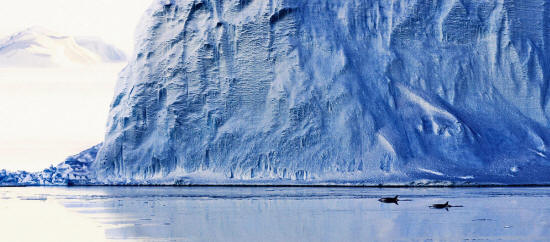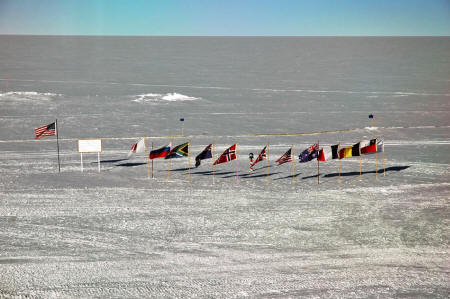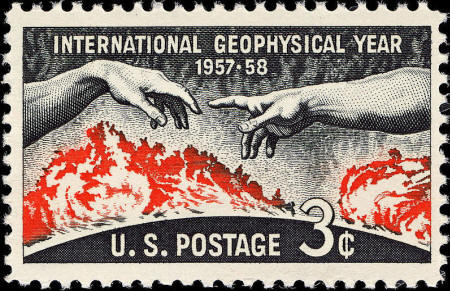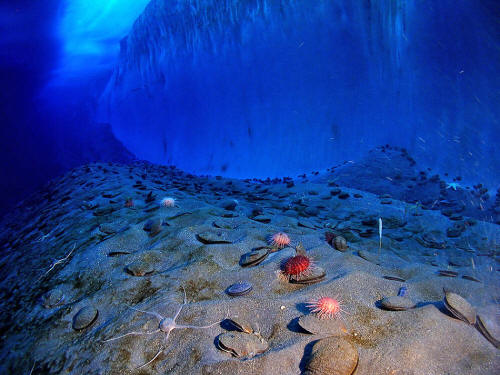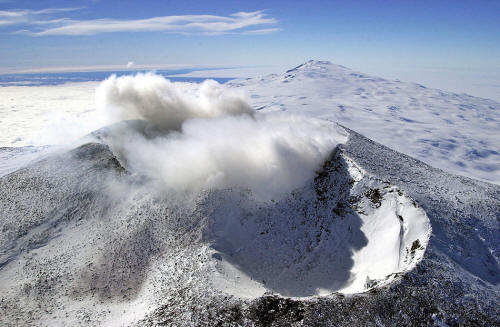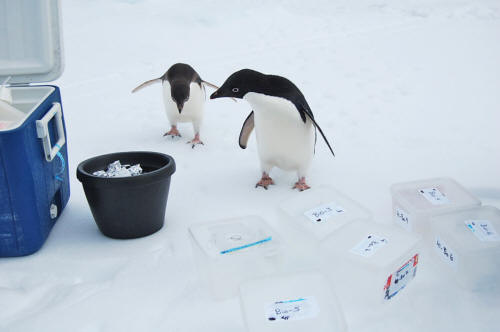|
from
MotherBoard Website
Now, many of those nations have thrown scientific diplomacy to the wind, and are increasingly fighting over ownership of a tiny - but hugely valuable - stretch of Antarctic ocean that few have ever seen.
Between 1957 and 1958, global teams of researchers participated in a monumental scientific truce called the International Geophysical Year (IGY).
The agreement allowed a union of countries to dispatch experts to remote ends of the Earth on collaborative expeditions aimed at studying unknown geological phenomena.
Under the guidance of the International Council of Scientific Unions, a special committee was formed to ensure the missions would remain,
Following post-World War II advances in science, there was no better time for discovery.
And the IGY offered a promising opportunity for physicists to showcase their innovative work in the burgeoning research of,
...and other nascent disciplines.
Flags of the 12 nations that signed the Antarctic Treaty fly around the ceremonial pole at the Amundsen-Scott South Pole station.
Image:
University of Maryland Particle Astrophysics Group
The intense rivalry between Cold War powers stimulated science programs that might enhance national defense and espionage capabilities.
Political, financial, institutional, and moral support were provided to aerospace engineering and geographic intelligence in particular.
State-sponsored technological endeavors, however, often placed scientists under intense political control, and offered them little professional autonomy. What the IGY guaranteed them was research for research's sake, more or less free of political interests.
At a National Press Club ceremony in 1958, Dr. Hugh Odish, executive director of the US National Committee for the IGY, said of the program:
Several countries honed their attention on the uncharted, alien landscapes of Antarctica.
Explorers had been there before - Norwegian adventurer Roald Amundsen was the first person to survive the daunting trek, and planted Norway's flag in the South Pole on December 14, 1912.
But subsequent travels to the ice-ridden land mass were plagued with fatalities and survival obstacles, and less time was spent studying Antarctica than enduring its inhospitable conditions.
Eager to create new legacies, polar scientists from,
...proved that unprecedented international cooperation could successfully demystify elements of the most understudied frontier on earth.
International Geophysical Year 3-cent 1958 issue US stamp. Image: Wikipedia/National Postal Museum
During their tenure in Antarctica, scientists achieved numerous discoveries and breakthroughs:
When the 18-month detente came to a close, none of the powers wished to leave - physically or symbolically.
Each had established research alliances during that time, and wished for Antarctica to remain a terra nullius for freedom of scientific investigation. Should military powers suddenly race to claim Antarctica, the diplomatic progress gained through the IGY would certainly be quashed.
In 1959, the Antarctic Treaty was signed into effect, dividing peaceful governance of the uninhabited continent between the 12 vested nations.
According to the agreement, Antarctica and its ice shelves would be set aside as a scientific preserve, and should remain free of any military conduct. It marked the first arms control agreement established during the Cold War.
As declared by the treaty, it was,
Now, decades later, those original signatories are at odds over a vital sliver of ecologically and industrially important ocean habitat - the Antarctic's Ross Sea.
The Ross Sea, nicknamed "The Last Ocean," has remained relatively untouched by human activity, pollution, and invasive species, largely due to its remote location and formidable conditions.
Scientists regard it as the only unspoiled ocean system on Earth.
Ice wall underneath the water at the Ross Sea's McMurdo Sound. Image: NSF/USAP/Steve Clabuesch
Discovered by British explorer James Clark Ross in 1841, the Ross Sea is one of two areas of the Southern Ocean, and stretches 1.9 million square miles over an incredibly deep continental shelf.
Unique climatology, oceanography, and geography have made the Ross Sea an unusually diverse and rich ecosystem.
The region is home to apex predators such as Antarctic minke whales and Ross Sea killer whales, in addition to one third of the world's Adélie penguins, emperor penguins, and nearly half the Southern Pacific population of Weddell seals.
Currently, seven countries assert disputed territorial ownership of Antarctica. New Zealand, whose jurisdiction includes the Ross Ice Shelf, maintains a controversial and largely unrecognized claim of the Ross Sea's land masses.
Technically, the Southern Ocean surrounding the polar continent belongs to NO ONE, so control over how it should be utilized and protected falls under various different treaties and protocols.
According to the United Nations Convention on the Law of the Sea, exclusive economic zones may condone exploration and natural resource extraction in certain offshore areas claimed by a coastal state.
However, since many of the territorial claims to Antarctica are disputed, the designation of exclusive economic zones in its waters have been subject to UN resolution.
Australia, Chile, France, and the United Kingdom have each made claims to Antarctica's continental shelf.
View of active volcano Mount Erebus on Ross Island in the Ross Sea. Erebus is the second highest volcano in Antarctica. Image: Wikipedia/United States Antarctic Program
Since 2013, environmentalists from the Commission for the Conservation of Antarctic Marine Living Resources (CCAMLR) have been vying to see it designated as the world's largest marine reserve.
More than 700,000 square miles of water would be set aside for conservation and research.
The commission's 25 member states, which include those nations belonging to the Antarctic Treaty, voted in favor of the sanctuary with further backing from the European Union.
But repeated attempts by the CCAMLR to enact the bid have been vetoed and blocked by Russia, China, and the Ukraine, whose commercial fishing interests are threatened by the strict marine protections put forth in the piece of conservation legislation.
China recently agreed to approve the sanctuary in a revised edition of the proposal, but in spite of amendments that would allow some fishing in certain areas, Russia's continued opposition has halted its progress five times in three years.
This month, however, scientists and international delegates convening at the Antarctic Treaty's thirty-ninth annual meeting will likely launch a diplomatic campaign aimed at finding unilateral support for the environmental proposal.
Past attempts to compromise with Russia have resulted in conservationists halving the amount of territory that would be protected by the proposed reserve.
The CCAMLR has considered Russia's demands for fishing access, and is hopeful that increased diplomatic measures will ease geopolitical unrest. Some environmental groups have criticized the CCAMLR for its inability to create the Ross Sea sanctuary.
Representatives of Greenpeace have stated that fishing interests are exerting too much control over ocean governance bodies such as the CCAMLR, and engendering distrust in conservation agencies' ability to protect marine ecosystems.
Permanent marine protections couldn't come soon enough, as commercial and illegal fishing threaten to inflict irreversible damage on this pristine ecosystem.
Overfishing of Antarctic toothfish, a type of cod that's sometimes referred to as "white gold" due to its lucrative value, could topple the ocean's food chain.
After a fishing boom in the 1900s, stocks in the Southern Ocean are still suffering from its impacts. Toothfish can weigh in at 300 pounds, and take up to 15 years to mature, making them slow to recover from dips in population numbers.
Scientists monitoring the trophic effects of declining toothfish numbers have already noted decreases in the prevalence of both Ross Sea killer whales and Weddell seals, which rely on the fish as a key food source.
Adélie penguins investigate researchers' phytoplankton samples.
Image:
Wikipedia/Georgia
Institute of Technology
Antarctica's krill-rich waters are also a source of tension for countries such as China who wish to expand fishing expeditions for Antarctic krill, bypassing the annual catch limitations designated by the CCAMLR.
Approximately 500 million tons of krill are believed to exist in the Southern Ocean, and China's National Agricultural Development group has been reported as saying the country aims to harvest one to two million tons annually.
The original members of the Antarctic Treaty hoped the region would remain a neutral territory for innovation and cooperative exploration.
For a short time, Antarctica was a proving ground for the potential of scientific diplomacy. Now, it seems to exemplify the shortcomings of over-reaching sovereignty and industrial excess with little environmental consideration.
Together, the United Nations, various NGOs, the Antarctic Treaty, and the CCAMLR effectively regulate the majority of Antarctica's natural resources. Whether or not Antarctica's last ecosystems can be saved will be determined in years to come.
But hopefully nations can once more put aside their discords and unite under a common cause inspired by the wonders of the wildest frontier on earth.
|


